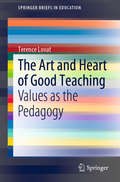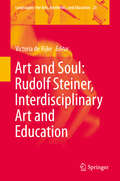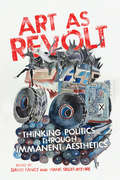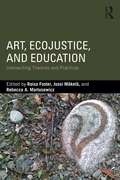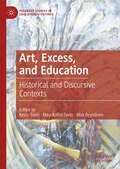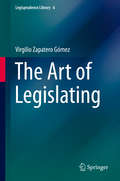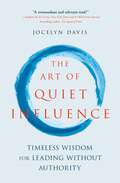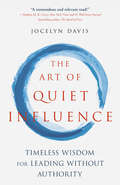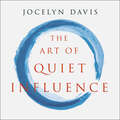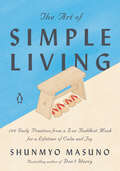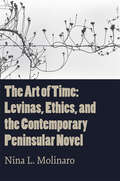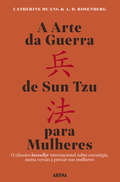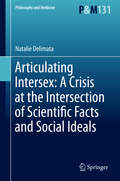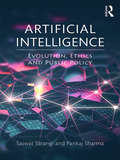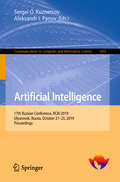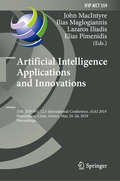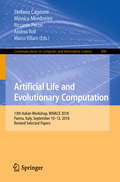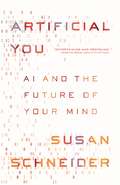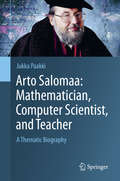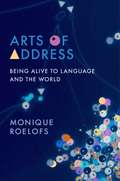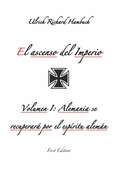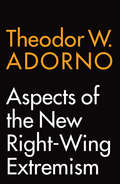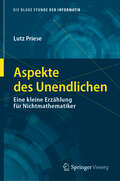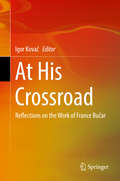- Table View
- List View
The Art and Heart of Good Teaching: Values as the Pedagogy (SpringerBriefs in Education)
by Terence LovatThis book summarizes and updates findings from the Australian Values Education Program with a focus on the latest international research in the field, both theoretical and practice-based. Further, it provides a theoretical and practical basis for understanding the disenchantment with low-level accountability approaches to learning (e.g. NAPLAN in Australia). In turn, the book demonstrates the effectiveness of Values Education as a holistic pedagogy with the potential to enhance students’ learning effects in terms of their personal, social, emotional and academic development. It offers well-tested alternative pedagogical approaches, based on research insights largely originating from actual classroom-based practice.
Art and Soul: Rudolf Steiner, Interdisciplinary Art and Education (Landscapes: the Arts, Aesthetics, and Education #25)
by Victoria De RijkeThis book brings together Steiner's philosophical, biodynamic and cultural contributions to education, where 'spirit' and ‘soul’ are the creative elements in human evolution. His thought is applied to selected examples of innovative artistic practice and pedagogy of the present. This volume is intended for researchers in the arts and education with an interest in Rudolf Steiner's huge influence on educational thought and policy.This is an urgent point in time to reflect on the role of arts in education and what it might mean for our souls. An accessible yet scholarly study of interdisciplinarity, imagination and creativity is of critical widespread interest now, when arts education in many countries is threatened with near-extinction.
Art as Revolt: Thinking Politics through Immanent Aesthetics
by David Fancy Hans Skott-MyhreHow can we imagine a future not driven by capitalist assumptions about humans and the wider world? How are a range of contemporary artistic and popular cultural practices already providing pathways to post-capitalist futures? Authors from a variety of disciplines answer these questions through writings on blues and hip hop, virtual reality, post-colonial science fiction, virtual gaming, riot grrrls and punk, raku pottery, post-pornography fanzines, zombie films, and role playing. The essays in Art as Revolt are clustered around themes such as technology and the future, aesthetics and resistance, and ethnographies of the self beyond traditional understandings of identity. Using philosophies of immanence – describing a system that gives rise to itself, independent of outside forces – drawn from a rich and evolving tradition that includes Spinoza, Nietzsche, Deleuze, and Braidotti, the authors and editors provide an engrossing range of analysis and speculation. Together the essays, written by experts in their fields, stage an important collective, transdisciplinary conversation about how best to talk about art and politics today. Sophisticated in its theoretical and philosophical premises, and engaging some of the most pressing questions in cultural studies and artistic practice today, Art as Revolt does not provide comfortable closure. Instead, it is understood by its authors to be a “Dionysian machine,” a generator of open-ended possibility and potential that challenges readers to affirm their own belief in the futures of this world. Contributors include Timothy J. Beck (University of West Georgia) Mark Bishop (Independent Scholar), Dave Collins (University of West Georgia), David Fancy (Brock University), Veronica Pacini-Ketchabaw (University of Western Ontario), Malisa Kurtz (Independent Scholar), Nicole Land (Ryerson University), Eric Lochhead (Youth Author Calgary Alberta) , Douglas Ord (Doctoral Student University of Western Ontario), Peter Rehberg (Institute for Cultural Inquiry—Berlin), Chris Richardson (Young Harris College), Hans Skott-Myhre (Kennesaw State University), Kathleen Skott-Myhre (University of West Georgia), and Joanna Wasiak (Independent Scholar).
Art as Revolt: Thinking Politics through Immanent Aesthetics
by David Fancy and Hans Skott-MyhreHow can we imagine a future not driven by capitalist assumptions about humans and the wider world? How are a range of contemporary artistic and popular cultural practices already providing pathways to post-capitalist futures? Authors from a variety of disciplines answer these questions through writings on blues and hip hop, virtual reality, post-colonial science fiction, virtual gaming, riot grrrls and punk, raku pottery, post-pornography fanzines, zombie films, and role playing. The essays in Art as Revolt are clustered around themes such as technology and the future, aesthetics and resistance, and ethnographies of the self beyond traditional understandings of identity. Using philosophies of immanence – describing a system that gives rise to itself, independent of outside forces – drawn from a rich and evolving tradition that includes Spinoza, Nietzsche, Deleuze, and Braidotti, the authors and editors provide an engrossing range of analysis and speculation. Together the essays, written by experts in their fields, stage an important collective, transdisciplinary conversation about how best to talk about art and politics today. Sophisticated in its theoretical and philosophical premises, and engaging some of the most pressing questions in cultural studies and artistic practice today, Art as Revolt does not provide comfortable closure. Instead, it is understood by its authors to be a “Dionysian machine,” a generator of open-ended possibility and potential that challenges readers to affirm their own belief in the futures of this world. Contributors include Timothy J. Beck (University of West Georgia), Mark Bishop (Independent Scholar), Dave Collins (University of West Georgia), David Fancy (Brock University), Veronica Pacini-Ketchabaw (University of Western Ontario), Malisa Kurtz (Independent Scholar), Nicole Land (Ryerson University), Eric Lochhead (Youth Author Calgary Alberta), Douglas Ord (Doctoral Student University of Western Ontario), Joanna Perkins (Independent Scholar), Peter Rehberg (Institute for Cultural Inquiry—Berlin), Chris Richardson (Young Harris College), Hans Skott-Myhre (Kennesaw State University), and Kathleen Skott-Myhre (University of West Georgia).
Art, EcoJustice, and Education: Intersecting Theories and Practices
by Raisa Foster Jussi Mäkelä Rebecca A. MartusewiczEmphasizing the importance of contemporary art forms in EcoJustice Education, this book examines the interconnections between social justice and ecological well-being, and the role of art to enact change in destructive systems. Artists, educators, and scholars in diverse disciplines from around the world explore the power of art to disrupt ways of thinking that are taken for granted and dominate modern discourses, including approaches to education. The EcoJustice framework presented in this book identifies three strands—cultural ecological analysis, revitalizing the commons, and enacting imagination—that help students to recognize the value in diverse ways of knowing and being, reflect on their own assumptions, and develop their critical analytic powers in relation to important problems. This distinctive collection offers educators a mix of practical resources and inspiration to expand their pedagogical practices. A Companion Website includes interactive artworks, supplemental resources, and guiding questions for students and instructors.
Art, Excess, and Education: Historical and Discursive Contexts (Palgrave Studies in Educational Futures)
by Kevin Tavin Mira Kallio-Tavin Max RyynänenThis book concentrates on the deep historical, political, and institutional relationships between art, education, and excess. Going beyond field specific discourses of art history, art criticism, philosophy, and aesthetics, it explores how the concept of excess has been important and enduring from antiquity through contemporary art, and from early film through the newer interactive media. Examples considered throughout the book focus on disgust, grandiosity, sex, violence, horror, disfigurement, endurance, shock, abundance, and emptiness, and frames them all within an educational context. Together they provide theories and classificatory systems, historical and political interpretations of art and excess, examples of popular culture, and suggestions for the future of educational practice.
The Art of Legislating (Legisprudence Library #6)
by Virgilio Zapatero GómezAny contemporary state presents itself as committed to the “rule of law”, and this notion is perhaps the most powerful political ideal within the current global discourse on legal and political institutions. Despite being a contested concept, the rule of law is generally recognised as meaning that government is bound in all its actions by fixed and public rules, and that these rules respect certain formal requirements and are enforced by an independent judiciary. This book focuses on formal legality and the question of how to achieve good laws—a topic that was famously addressed by the 18th century enlightened thinkers, but also by prominent legal scholars of our time. Historically, the canon of “good legislation” demanded generality, publicity and accessibility, and comprehensibility of laws; non-retroactivity; consistency; the possibility of complying with legal obligations and prohibitions; stability; and congruency between enacted laws and their application. All these are valuable ideals that should not be abandoned in today’s legal systems, particularly in view of the silent revolution that is transforming our legality-based “states of law” into jurisdictional states. Such ideals are still worth pursuing for those who believe in representative democracy, in the rule of law and in the dignity of legislation. The idea for the book stemmed from the author’s parliamentary and governmental experience; he was responsible for the Government of Spain’s legislative co-ordination from 1982 to 1993, which were years of intensive legislative production. The more than five hundred laws (and thousands of decrees) elaborated in this period profoundly changed all sectors of the legal order inherited from Franco’s dictatorship, and laid the foundations of a new social and democratic system. For an academic, this was an exciting experience, which offered a unique opportunity to put the theory of legislation to the test. Reflecting and elaborating on this experience, the book not only increases scholarly awareness of how laws are made, but above all, improves the quality of legislation and as a result the rule of law.
The Art of Quiet Influence: Timeless Wisdom for Leading Without Authority
by Jocelyn DavisInfluence is getting things done without coercion. It's strength without force-mindfulness in action. Master influencers walk lightly, talk softly and have no need of a big stick, yet collective success hinges on their words and deeds.Anyone can be a quiet influencer. Featuring twelve specific practices, twelve typical pitfalls and dozens of powerful stories and examples, The Art of Quiet Influence is a roadmap for the journey. Author Jocelyn Davis weaves together the timeless wisdom of Eastern thinkers-from Confucius to the Buddha, from Rumi to Gandhi-with research and insights from modern-day experts, revealing what's wrong with the Western view of influence as short-term persuasion and showing instead how to create trust-based collaborations with lasting impact.
The Art of Quiet Influence: Timeless Wisdom for Leading without Authority
by Jocelyn DavisAnyone can be a quiet influencer. But not everyone knows how."A tremendous and relevant read!" -Stephen M. R. Covey, New York Times and #1 Wall Street Journal bestselling author of The Speed of TrustDrawing on the enduring wisdom of the Buddha, Confucius, Rumi, Gandhi and others, The Art of Quiet Influence shows anyone, not just bosses, how to use influence without authority, a key mindfulness principle, to get things done at work and in life. Through the classic wisdom of 12 Eastern sages, relevant insights from influence research, and anecdotes and advice from 25 contemporary experts, Davis lays out a path for becoming a "mainspring," the unobtrusive yet powerful influencer first introduced in her book The Greats on Leadership. Organized around three core influence practices - Invite Participation, Share Power, and Aid Progress - readers will learn how to take mindfulness practice "out of the gym and onto the field," while gaining the confidence and practical know-how to be influential in whatever role they occupy.
The Art of Quiet Influence: Timeless Wisdom for Leading Without Authority
by Jocelyn DavisMindfulness meets execution . . . at work. The wisdom of 13 Eastern sages, augmented by modern research on workplace influence, is the basis for profound yet practical advice on getting things done without force.The Art of Quiet Influence shows anyone how to use influence, a key mindfulness principle, to get things done at work. Through the classic wisdom of 13 Eastern sages (especially the Buddha), relevant insights from influence research, and anecdotes and advice from 25 contemporary experts, Davis lays out a path for becoming a 'mainspring,' an unobtrusive yet powerful influencer.Organised around three core influence practices: Invite Participation, Share Power, and Aid Progress, readers will learn how to take mindfulness practice 'out of the gym and onto the field,' while gaining the confidence and practical know-how to be influential in whatever role they occupy.(P)2019 Hodder & Stoughton Limited
The Art of Simple Living: 100 Daily Practices from a Japanese Zen Monk for a Lifetime of Calm and Joy
by Shunmyo Masuno"Does for mental clutter what Marie Kondo has done for household clutter." --Publishers WeeklyRelax and find happiness amid the swirl of the modern world with this internationally bestselling guide to simplifying your life by a Japanese monk who embodies the wisdom of Zen.In clear, practical, easily adopted lessons--one a day for 100 days--renowned Buddhist monk Shunmyo Masuno draws on centuries of wisdom to teach you to Zen your life. Discover how . . . * lining up your shoes after you take them off can bring order to your mind; * joining your hands together in gassho can soothe irritation and conflict; * putting down your fork after every bite can help you feel more grateful for what you have; * understanding the concept of ichi-go ichi-e can make everyday interactions more meaningful; * immersing yourself in zazen can sweep the clutter from your mind; * planting a flower and watching it grow can teach you to embrace change; * practicing chisoku can help you feel more fulfilled; * going outside to watch the sunset can make every day feel celebratory.A minimalist line drawing appears opposite each lesson on an otherwise blank page, giving you an opportunity to relax with a deep breath between lessons. With each daily practice, you will learn to find happiness not by seeking out extraordinary experiences but by making small changes to your life, opening yourself up to a renewed sense of peace and inner calm.
The Art of Time: Levinas, Ethics, and the Contemporary Peninsular Novel
by Nina L MolinaroEthics, or the systematized set of inquiries and responses to the question “what should I do?” has infused the history of human narrative for more than two centuries. One of the foremost theorists of ethics during the twentieth century, Emmanuel Levinas (1906-1995) radicalized the discipline of philosophy by arguing that “the ethical” is the foundational moment for human subjectivity, and that human subjectivity underlies all of Western philosophy. Levinas’s voice is crucial to the resurging global attention to ethics because he grapples with the quintessential problem of alterity or “otherness,” which he conceptualizes as the articulation of, and prior responsibility to, difference in relation to the competing movement toward sameness. Academicians and journalists in Spain and abroad have recently fastened on an emerging cluster of peninsular writers who, they argue, pertain to a discernible literary generation, provisionally referred to as Generación X. These writers are distinct from their predecessors; they and their literary texts are closely related to the specific socio-political and historical circumstances in Spain; and their novels relate stories of more and less proximity, more and less responsibility, and more and less temporality. In short, they trace the temporal movement of alterity through narrative. Published by Bucknell University Press. Distributed worldwide by Rutgers University Press.
A Arte da Guerra de Sun Tzu para mulheres
by Catherine Huang Arthur D. RosenbergO clássico bestseller internacional sobre estratégia, numa versão a pensar nas mulheres A suprema arte da guerra é derrotar o inimigo sem lutar Seguindo os antigos ensinamentos chineses d'A Arte da Guerra, vai descobrir como usar as competências naturais para encontrar o seu caminho na vida. Os ensinamentos de Sun Tzu, aqui adaptados para as mulheres, foram ajuda preciosa para estas encontrarem o caminho pacífico para o sucesso por meio de estratégias e abordagens que ficaram famosas no antigo texto chinês: A arte da guerra. A sabedoria feminina, ou o bom senso, trata de evitar confrontos desnecessários, conservar energia para as coisas que importam e procurar um resultado em que todos saiam vencedores. E para as mulheres, como para Sun Tzu, o sucesso não vem simplesmente de saber o que fazer, mas de saber quem somos. A arte da guerra de Sun Tzu para mulheres vai ajudá-la a considerar o que deseja alcançar e porque deseja alcançá-lo. Cobrindo os princípios intemporais de Sun Tzu ponto a ponto, num tom simples e prático, mostra como pode encontrar os seus pontos fortes, enfrentar os seus pontos fracos, lidar com os obstáculos e forjar a sua própria e única identidade através da carreira e da vida pessoal. Seja qual for o caminho a seguir, este livro dar-lhe-á estratégias, tácticas e exemplos práticos daquilo que precisa para aumentar a sua probabilidade de sucesso - e desfrutar durante todo o processo. «Qualquer que seja o seu caminho e objectivos pessoais na vida, A arte da guerra de Sun Tzu para mulheres fornece estratégias eficazes, tácticas e exemplos práticos de que precisa para aumentar a sua probabilidade de alcançar o sucesso.»Midwest Book Review
Articulating Intersex: A Crisis at the Intersection of Scientific Facts and Social Ideals (Philosophy and Medicine #131)
by Natalie DelimataThis book explores the ethical dilemma clinicians may face when disclosing a diagnosis of atypical sex. The moment of disclosure reveals an epistemic incompatibility between scientific fact and social meaning in relation to sex. Attempting to assess the bio-psychosocial implications of this dilemma highlights a complex historic antagonism between fact and meaning making satisfactory resolution of this dilemma difficult. Drawing on David Hume, WVO Quine and Michel Foucault the author presents an integrative model, which views scientific fact and social meaning as codetermining threads in one fabric of knowledge. From this epistemic perspective, the ethical dilemma is understood as a tear in the fabric signifying a rupturing of ontological integrity. To mend this tear and resolve the ethical dilemma three metaphysical perspectives are considered: essentialism, naturalism and emergentism. The book’s unique features include: an exploration of the impact of diagnostic disclosure on people with atypical sex (intersex); a synthesis of the epistemic perspectives of social and natural science facilitating interdisciplinary collaboration; a critical evaluation of three metaphysical perspectives on atypical sex (intersex); the application of Hume’s epistemological and moral distinctions to contemporary biomedicine and bioethics. The book’s target audience includes academics, students and professionals whose work intersects the natural and social sciences, and individuals interested in the metaphysics, epistemology and meta-ethics of sex.
Artificial Intelligence: Evolution, Ethics and Public Policy
by Saswat Sarangi Pankaj SharmaWhat will the future be? A dystopian landscape controlled by machines or a brave new world full of possibilities? Perhaps the answer lies with Artificial Intelligence (AI)—a phenomenon much beyond technology that has, continues to, and will shape lives in ways we do not understand yet. This book traces the evolution of AI in contemporary history. It analyses how AI is primarily being driven by "capital" as the only "factor of production" and its consequences for the global political economy. It further explores the dystopian prospect of mass unemployment by AI and takes up the ethical aspects of AI and its possible use in undermining natural and fundamental rights. A tract for the times, this volume will be a major intervention in an area that is heavily debated but rarely understood. It will be essential reading for researchers and students of digital humanities, politics, economics, science and technology studies, physics, and computer science. It will also be key reading for policy makers, cyber experts and bureaucrats.
Artificial Intelligence: 17th Russian Conference, RCAI 2019, Ulyanovsk, Russia, October 21–25, 2019, Proceedings (Communications in Computer and Information Science #1093)
by Sergei O. Kuznetsov Aleksandr I. PanovThis book constitutes the proceedings of the 17th Russian Conference on Artificial Intelligence, RCAI 2019, held in Ulyanovsk, Russia, in October 2019. The 23 full papers presented along with 7 short papers in this volume were carefully reviewed and selected from 130 submissions. The conference deals with a wide range of topics, including multi-agent systems, intelligent robots and behaviour planning; automated reasoning and data mining; natural language processing and understanding of texts; fuzzy models and soft computing; intelligent systems and applications.
Artificial Intelligence Applications and Innovations: 15th IFIP WG 12.5 International Conference, AIAI 2019, Hersonissos, Crete, Greece, May 24–26, 2019, Proceedings (IFIP Advances in Information and Communication Technology #559)
by John MacIntyre Ilias Maglogiannis Lazaros Iliadis Elias PimenidisThis book constitutes the refereed proceedings of the 15th IFIP WG 12.5 International Conference on Artificial Intelligence Applications and Innovations, AIAI 2019, held in Hersonissos, Crete, Greece, in May 2019.The 49 full papers and 6 short papers presented were carefully reviewed and selected from 101 submissions. They cover a broad range of topics such as deep learning ANN; genetic algorithms - optimization; constraints modeling; ANN training algorithms; social media intelligent modeling; text mining/machine translation; fuzzy modeling; biomedical and bioinformatics algorithms and systems; feature selection; emotion recognition; hybrid Intelligent models; classification - pattern recognition; intelligent security modeling; complex stochastic games; unsupervised machine learning; ANN in industry; intelligent clustering; convolutional and recurrent ANN; recommender systems; intelligent telecommunications modeling; and intelligent hybrid systems using Internet of Things. The papers are organized in the following topical sections:AI anomaly detection - active learning; autonomous vehicles - aerial vehicles; biomedical AI; classification - clustering; constraint programming - brain inspired modeling; deep learning - convolutional ANN; fuzzy modeling; learning automata - logic based reasoning; machine learning - natural language; multi agent - IoT; nature inspired flight and robot; control - machine vision; and recommendation systems.
Artificial Life and Evolutionary Computation: 13th Italian Workshop, WIVACE 2018, Parma, Italy, September 10–12, 2018, Revised Selected Papers (Communications in Computer and Information Science #900)
by Stefano Cagnoni Monica Mordonini Riccardo Pecori Andrea Roli Marco VillaniThis book constitutes the revised selected papers of the 13th Italian Workshop on Artificial Life and Evolutionary Computation, WIVACE 2018, held in Parma, Italy, in September 2018. The 12 full papers presented were thoroughly reviewed and selected from 30 submissions. They cover the following topics: Boolean networks and complex systems; economic, societal and technological applications; chemical, biological and medical applications. The chapter “Unveiling Latent Relations in the Photonics Techno-Economic Complex System” is open access under a CC BY 4.0 license at link.springer.com.
Artificial You: AI and the Future of Your Mind
by Susan SchneiderA sober-minded philosophical exploration of what AI can and cannot achieveHumans may not be Earth’s most intelligent beings for much longer: the world champions of chess, Go, and Jeopardy! are now all AIs. Given the rapid pace of progress in AI, many predict that it could advance to human-level intelligence within the next several decades. From there, it could quickly outpace human intelligence. What do these developments mean for the future of the mind?In Artificial You, Susan Schneider says that it is inevitable that AI will take intelligence in new directions, but urges that it is up to us to carve out a sensible path forward. As AI technology turns inward, reshaping the brain, as well as outward, potentially creating machine minds, it is crucial to beware. Homo sapiens, as mind designers, will be playing with "tools" they do not understand how to use: the self, the mind, and consciousness. Schneider argues that an insufficient grasp of the nature of these entities could undermine the use of AI and brain enhancement technology, bringing about the demise or suffering of conscious beings. To flourish, we must grasp the philosophical issues lying beneath the algorithms.At the heart of her exploration is a sober-minded discussion of what AI can truly achieve: Can robots really be conscious? Can we merge with AI, as tech leaders like Elon Musk and Ray Kurzweil suggest? Is the mind just a program? Examining these thorny issues, Schneider proposes ways we can test for machine consciousness, questions whether consciousness is an unavoidable byproduct of sophisticated intelligence, and considers the overall dangers of creating machine minds.
Arto Salomaa: A Thematic Biography
by Jukka PaakkiThis book outlines the scientific career of Arto Salomaa, a pioneer in theoretical computer science and mathematics. The author first interviewed the subject and his family and collaborators, and he then researched this fascinating biography of an intellectual who was key in the development of these fields.Early chapters progress chronologically from Academician Salomaa's origins, childhood, and education to his professional successes in science, teaching, and publishing. His most impactful direct research efforts have been in the areas of automata and formal languages. Beyond that he has influenced many more scientists and professionals through collaborations, teaching, and books on topics such as biocomputing and cryptography. The author offers insights into Finnish history, culture, and academia, while historians of computer science will appreciate the vignettes describing some of the people who have shaped the field from the 1950s to today. The author and his subject return throughout to underlying themes such as the importance of family and the value of longstanding collegial relationships, while the work and achievements are leavened with humor and references to interests such as music, sport, and the sauna.
Arts of Address: Being Alive to Language and the World (Columbia Themes in Philosophy, Social Criticism, and the Arts)
by Monique RoelofsModes of address are forms of signification that we direct at living beings, things, and places, and they at us and at each other. Seeing is a form of address. So are speaking, singing, and painting. Initiating or responding to such calls, we participate in encounters with the world. Widely used yet less often examined in its own right, the notion of address cries out for analysis.Monique Roelofs offers a pathbreaking systematic model of the field of address and puts it to work in the arts, critical theory, and social life. She shows how address props up finely hewn modalities of relationality, agency, and normativity. Address exceeds a one-on-one pairing of cultural productions with their audiences. As ardently energizing tiny slippages and snippets as fueling larger impulses in the society, it activates and reaestheticizes registers of race, gender, class, coloniality, and cosmopolitanism. In readings of writers and artists ranging from Julio Cortázar to Jamaica Kincaid and from Martha Rosler to Pope.L, Roelofs demonstrates the centrality of address to freedom and a critical political aesthetics. Under the banner of a unified concept of address, Hume, Kant, and Foucault strike up conversations with Benjamin, Barthes, Althusser, Fanon, Anzaldúa, and Butler. Drawing on a wide array of artistic and theoretical sources and challenging disciplinary boundaries, the book illuminates address’s significance to cultural existence and to our reflexive aesthetic engagement in it. Keeping the reader on the lookout for flash fiction that pops up out of nowhere and for insurgent whisperings that take to the air, Arts of Address explores the aliveness of being alive.
El ascenso del Imperio: Alemania solo se recuperará con el espíritu alemán
by Ulrich Richard HambuchEl pueblo de poetas y pensadores, que en dos ocasiones ha sido víctima de terribles guerras mundiales en la historia reciente, se encuentra nuevamente en una profunda crisis en estos días y se encuentra en una encrucijada. En los últimos siete años, en este contexto se han producido innumerables obras, analíticamente brillantes, pero sobrias, extensas y para la mayoría incomprensibles y, por lo tanto, en última instancia, sólo fugaces, en las que los autores se sintieron llamados a descubrir y denunciar las cosas que, consciente o inconscientemente, se han producido. inconscientemente nos oprimió en las últimas décadas. Sin embargo, en última instancia, todos los autores que conocí no lograron esbozar una alternativa holística y sostenible al estado actual. Esto tenía que remediarse. Hoy lo considero una coincidencia del destino, que durante algunos años no me ha permitido desde muchos lados continuar mi actividad habitual de manera permanente y en toda su extensión y el destino me llevó a partir de ahora a dedicarme en reclusión e imparcialidad al tema de encontrando la verdad. Como persona que, después de un tiempo de aprender, pensar, sentir y hacer una pausa, es capaz de actuar, no pude encontrar un hogar en ninguna fiesta, empresa o lugar en la República Federal de Alemania. Así que decidí sin más preámbulos crear este hogar político, secular y espiritual ideal para mí.
Aspects of the New Right-Wing Extremism
by Theodor W. AdornoOn 6 April 1967, at the invitation of the Socialist Students of Austria at the University of Vienna, Theodor W. Adorno gave a lecture which is not merely of historical interest. Against the background of the rise of the National Democratic Party of Germany, which had enjoyed remarkable electoral success in the first two years after its formation in November 1964, Adorno analysed the goals, resources and tactics of the new right-wing nationalism of this time. Contrasting it with the ‘old’ fascism of the Nazis, Adorno gave particular attention to the ways in which far-right movements elicited enthusiastic support in sections of the West German population, 20 years after the war had ended. Much has changed since then, but some elements have remained the same or resurfaced in new forms, 50 years later. Adorno’s penetrating analysis of the sources of right-wing radicalism is as relevant today as it was five decades ago. It is a prescient message to future generations who find themselves embroiled once again in a struggle against a resurgent nationalism and right-wing extremism.
Aspekte des Unendlichen: Eine kleine Erzählung für Nichtmathematiker (Die blaue Stunde der Informatik)
by Lutz PrieseEin Buch über die Unendlichkeit Wer glaubt, dass sich Rechnen auf trockene Formeln und Zahlen beschränkt, wird mit „Aspekte des Unendlichen – Eine kleine Erzählung für Nichtmathematiker“ sein blaues Wunder erleben. Dieses Buch spricht alle Leser an, die nicht nur die Logik, sondern auch die Poesie der Unendlichkeit erforschen möchten. Anstatt Laien mit kryptischem Akademikerjargon zu verwirren, übersetzt es komplexe Sachverhalte in leicht verständliche Erklärungen. So können auch Einsteiger erfahren, welche Überraschungen die Mengenlehre bereithält. Von nicht abzählbaren Größen und unentscheidbaren Fragen Die Wissenschaft der mathematischen Unendlichkeit umfasst zahlreiche Problemstellungen, die ebenso anspruchsvoll wie spannend sind. Dazu gehören unter anderem:· die Bibliothek von Babel· diskontinuierliche Kontinua· Unmengen· Paradoxien und Antinomien Um solche theoretischen Ansätze in ihren Grundzügen zu begreifen, braucht es keinen Hochschulabschluss. Lutz Prieses Buch über die Mathematik der Unendlichkeit verwandelt abstrakte Konzepte in lebensnahe Zusammenhänge. Der Autor ist promovierter Logiker und hält seit seiner Pensionierung regelmäßig Vorlesungen zu Themen der Mathematik und Informatik. Dank seiner langjährigen Tätigkeit als Hochschuldozent gelingt es ihm, mit einer unterhaltsamen Sprache Anfänger und Experten gleichermaßen zu fesseln. Dabei steht vor allem die Verbindung zwischen mathematischen und philosophischen Problemen im Vordergrund:· Wie genau können wir mit Zahlen die unendlichen Weiten des Weltalls erfassen?· Inwiefern spiegeln die Grenzen des Rechnens die Grenzen des menschlichen Daseins wider?· Wie können wir Unvorstellbares vorstellbar machen? Prieses Buch über die Unendlichkeit in der Mathematik liefert keine endgültigen Antworten auf diese Fragen. Vielmehr regt es Leser dazu an, sich selbst auf die Suche zu machen und eigene Ideen zu entwickeln. Wie es der Titel verspricht, lädt „Aspekte des Unendlichen“ zu einer schier endlosen Reise durch die Gedankenwelt ein.
At His Crossroad: Reflections on the Work of France Bučar
by Igor KovačThis book is a translation and celebration of Slovenian politician France Bučar’s seminal work. Divided into two parts, the book first contains several studies of Bučar’s arguments. As Bučar applied his system theory to a variety of issues, so too the conglomerate of scholars and issues critically assessed is interdisciplinary, ranging from political science and economics, to law and philosophy, as well as to natural sciences. The contributors and the questions of their essays in the edited volume are as follows. Peter Verovsek (University of Sheffield) examines different branches of Critical Theory and classifies Bučar within them. Mark Hamilton (Inter-American Defense College) discusses system dynamics of Bučar’s system theory. Urška Velikonja (Georgetown University) applies Bučar’s system theory to the question of the ethics, rules, and regulations in financial economics. Finally, Matej Drev (Georgia Institute of Technology) connects Bučar to the issue of artificial intelligence and inequality.The second part is the English translation of Bučar’s book At A New Crossroads, which addresses the role of ethics in society. Bučar normatively redefines national identity as the crux of his novel understanding of ethics. Using system theory, he addresses the problems of globalization and governance, presenting a post-modern synthesis of the logic of free flow of capital and global citizenship, with national and cultural identity. Speaking to contemporary society, he shows how society and ethical life are reproduced. Bučar provides the reader with new tools to think about national identity and global politics. Bringing an important work on ethics, government, and identity to an entirely new readership, this book will appeal to a broad academic audience, namely students and practitioners in the fields of economics, social sciences, and humanities.
